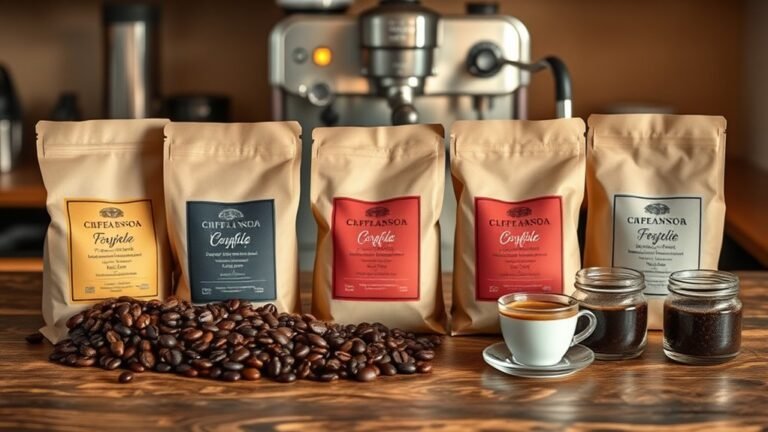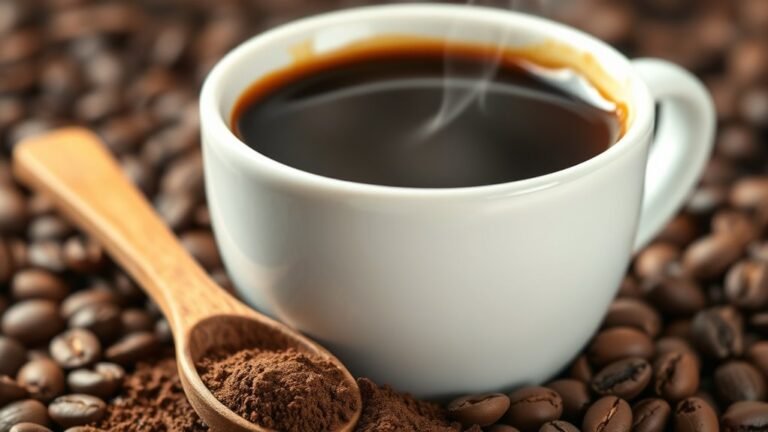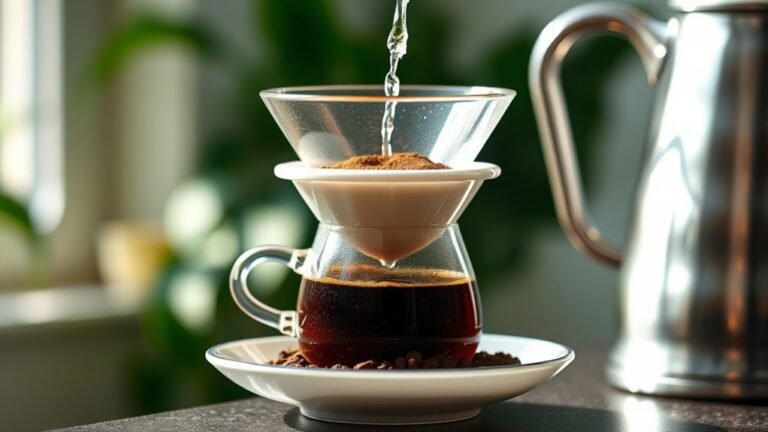The Best Decaf Coffee Beans
If you want the best decaf coffee beans, focus on high-quality origins, roast levels, and decaffeination methods like the Swiss Water or CO2 process for peak flavor retention. Brands like Kicking Horse Swiss Water and Volcanica Colombian offer rich, nuanced profiles without bitterness. Also, consider your brewing style—espresso or drip—to select beans matching your palate. Understanding these factors guarantees a satisfying cup, and there’s plenty more to enhance your decaf coffee experience.
What Makes Decaf Coffee Beans Unique

Although decaf coffee beans undergo a process to remove most of their caffeine, what makes them unique lies not only in this chemical alteration but also in how this impacts their flavor profile, aroma, and overall composition. When you explore decaf origins, you’ll find that the beans typically come from the same varietals as regular coffee but are selected with consideration for how well they retain taste post caffeine extraction. This process subtly shifts the bean’s chemical makeup, often muting some volatile compounds responsible for brightness and complexity, yet it also allows you to enjoy a smoother, less bitter cup. Understanding these nuances lets you appreciate decaf coffee not as an inferior alternative but as a distinct experience shaped by careful extraction and bean selection.
How Decaf Coffee Is Processed
When you plunge into how decaf coffee is processed, you’ll discover a series of meticulous steps designed to extract caffeine while preserving as much of the bean’s original character as possible. The process begins with careful coffee bean selection, ensuring only the best beans undergo decaffeination. Then, various decaffeination methods come into play:
- Swiss Water Process – Uses pure water to remove caffeine, maintaining flavor integrity without chemicals.
- CO2 Process – Employs carbon dioxide under pressure, targeting caffeine molecules selectively.
- Solvent-Based Process – Utilizes organic solvents like ethyl acetate, balancing efficiency with flavor retention.
Each method impacts the final taste differently, offering you freedom to choose decaf coffee that matches your flavor preferences and lifestyle.
Factors to Consider When Choosing Decaf Beans
What should you prioritize when selecting decaf coffee beans to guarantee a satisfying cup? First, consider the bean origin—different regions impart distinct flavor profiles, from fruity Ethiopian beans to nutty Colombian varieties. Choosing a bean origin that suits your taste preferences assures the decaf retains character despite caffeine removal. Next, pay attention to the roast level; lighter roasts preserve more of the bean’s natural complexity, while darker roasts deliver bolder, richer flavors. Since decaffeination can mute some notes, selecting the right roast level helps maintain balance and depth. Also, check the decaffeination method used, as it affects flavor retention. By focusing on these factors—bean origin and roast level—you can enjoy decaf coffee that feels just as liberating and flavorful as regular brews.
Top Decaf Coffee Bean Brands to Try

Exploring five standout decaf coffee bean brands can help you find a brew that matches your flavor preferences and quality standards. Decaf coffee reviews often highlight three brands that consistently excel in decaf taste comparisons:
- Swiss Water Decaf by Kicking Horse – Renowned for its chemical-free process, it offers rich, chocolatey notes with a smooth finish.
- Volcanica Coffee’s Colombian Decaf – Praised for maintaining bright acidity and fruity undertones despite decaffeination.
- Peet’s Decaf Major Dickason’s Blend – A robust, full-bodied option that balances bold flavors without bitterness.
Best Decaf Coffee Beans for Espresso
When choosing decaf coffee beans for espresso, you’ll want to focus on flavor profiles that maintain richness and balance despite the decaffeination process. Pay close attention to beans that offer bold, chocolatey, or nutty notes to complement espresso’s intensity. Additionally, mastering your brewing techniques can enhance these flavors, ensuring a smooth, satisfying shot every time.
Flavor Profiles
The flavor profile of decaf coffee beans designed for espresso is essential because it directly influences the intensity, balance, and crema quality in your shot. When selecting beans, consider how these elements will shape your experience:
- Bold Flavors: Look for beans that deliver rich, pronounced notes without bitterness, ensuring your espresso remains vibrant despite decaffeination.
- Smooth Textures: A velvety mouthfeel enhances drinkability, offering a creamy consistency that complements espresso’s concentrated nature.
- Balanced Acidity: Moderate acidity provides brightness and complexity, preventing the shot from feeling flat or dull.
Understanding these nuances lets you enjoy espresso freedom without compromise, capturing the essence of your brew with every sip.
Brewing Techniques
Although decaf coffee beans have unique characteristics, mastering your brewing technique is essential to revealing their full espresso potential. You’ll want to carefully control brewing temperature, ideally between 90-96°C, to prevent over-extraction that can dull the delicate decaf flavors. Precision in coffee ratios is also critical; typically, a 1:2 coffee-to-water ratio balances strength and smoothness, but slight adjustments can highlight different flavor notes. Since decaf beans often have a lighter body, dialing in your grind size to optimize extraction time is key. Experimenting with these variables grants you freedom to tailor your espresso shot, ensuring it’s rich and satisfying despite lacking caffeine. With attention to brewing temperature and coffee ratios, you unveil the nuanced complexity decaf espresso deserves.
Best Decaf Coffee Beans for Drip Coffee
Since drip coffee relies on a consistent extraction process, choosing the best decaf coffee beans is essential to maintaining flavor balance and aroma. You want beans that preserve the rich flavor nuances typical of their decaf coffee origins, ensuring a satisfying cup without caffeine’s buzz.
Here are three top picks for drip brewing:
- Swiss Water Process Colombian Decaf – Known for clean, bright notes and minimal flavor loss.
- Ethiopian Decaf – Offers fruity and floral undertones, enhancing your drip coffee’s complexity.
- Sumatra Decaf – Delivers earthy, full-bodied richness that stands up well to drip extraction.
Selecting beans with distinctive decaf coffee origins lets you enjoy freedom in flavor without compromise, making every drip brew a deliberate and delightful experience.
Tips for Brewing the Perfect Decaf Coffee
To brew the perfect decaf coffee, you’ll want to focus on controlling the water temperature precisely, aiming for around 195-205°F to extract balanced flavors without bitterness. Consistent grinding size is essential since uneven grounds can lead to over or under-extraction, affecting the taste. Finally, optimizing your brewing time guarantees you extract the right compounds—too short or too long can result in weak or overly bitter coffee.
Water Temperature Control
When you’re brewing decaf coffee, controlling the water temperature is essential because it directly affects the extraction of flavors from the beans. Too hot, and you risk over-extraction, resulting in bitterness; too cool, and under-extraction leaves your coffee flat and dull. To master flavor extraction, keep these points in mind:
- Aim for a water temperature between 195°F and 205°F (90°C–96°C) to balance solubility and preserve nuanced flavors.
- Use a thermometer or temperature-controlled kettle to maintain consistency, avoiding guesswork.
- Let boiled water sit for 30 seconds before pouring to reach ideal temperature, especially if you don’t have precise controls.
Grinding Consistency
Controlling water temperature sets the stage, but the grind consistency of your decaf coffee beans plays an equally important role in extracting balanced flavors. When you master your grinding techniques, you guarantee uniform particle size, which prevents over- or under-extraction. A consistent grind size allows water to flow evenly, releasing the delicate nuances in decaf beans without bitterness or sourness. Whether you prefer a fine grind for espresso or a coarser grind for a French press, precision is key. Avoid blade grinders that produce irregular fragments; instead, opt for burr grinders that deliver steady results. By controlling grind size with intentional grinding techniques, you maintain the freedom to tailor your brew’s flavor profile, fully appreciating the subtle complexity of decaf coffee.
Brewing Time Optimization
Although grind consistency sets the foundation, optimizing brewing time is essential to revealing the full potential of your decaf coffee’s flavor. Different brewing methods demand varied extraction times to balance acidity, bitterness, and body. You’ll want to tailor your approach to reveal nuanced taste profiles without over-extraction.
Here’s how to optimize brewing time effectively:
- Understand Your Brewing Method: Pour-over, French press, or espresso each requires specific extraction times—typically ranging from 2 to 5 minutes.
- Adjust Extraction Time Gradually: Start with recommended times, then fine-tune by seconds to avoid under- or over-extraction, which dulls flavor or introduces bitterness.
- Monitor Taste and Consistency: Regularly taste your brew and note changes with time adjustments, empowering you to craft your ideal cup.
Mastering extraction time lets you savor decaf coffee’s true character while maintaining the freedom to experiment.
Health Benefits of Drinking Decaf Coffee

Because decaf coffee contains considerably less caffeine than regular coffee, you can enjoy many of the same health benefits without the stimulating effects that may cause jitters or disrupt sleep. If you have caffeine sensitivity, decaf offers a way to savor coffee’s rich antioxidant content while minimizing adverse reactions. These antioxidants help reduce inflammation and protect cells from damage, supporting overall wellness.
| Benefit | Regular Coffee | Decaf Coffee |
|---|---|---|
| Antioxidant Content | High | Comparable |
| Caffeine Level | 70-140 mg/cup | 2-5 mg/cup |
| Sleep Impact | Can disrupt sleep | Minimal disruption |
Choosing decaf lets you embrace the freedom to enjoy coffee’s health perks without sacrificing your comfort or rest.
Frequently Asked Questions
Can Decaf Coffee Cause Insomnia?
Decaf coffee causing insomnia is like a whisper in a noisy room—it’s subtle but not impossible. While decaf caffeine levels are much lower than regular coffee, they’re not zero, which means if you’re sensitive, it might still affect your decaf sleep quality. You’ve got to evaluate your personal tolerance and timing. Drinking decaf late at night could disrupt your freedom to rest, so be mindful of how it impacts your body.
How Long Do Decaf Coffee Beans Stay Fresh?
Decaf coffee beans usually stay fresh for about two to four weeks after roasting if you store them properly. For ideal decaf storage, keep your beans in an airtight container, away from light, heat, and moisture. Freshness tips include grinding just before brewing and avoiding the fridge or freezer, which can cause condensation. By managing these factors, you’ll preserve flavor and enjoy your decaf coffee’s richness longer without sacrificing freedom or quality.
Is Decaf Coffee Safe During Pregnancy?
When it comes to pregnancy, decaf coffee lets you have your cake and eat it too by reducing caffeine intake while still enjoying coffee’s comfort. Decaf benefits include considerably lower pregnancy caffeine levels, which is safer for you and your baby. Although it’s not entirely caffeine-free, the minimal amount usually won’t harm. Still, it’s wise to monitor total daily caffeine from all sources to keep everything in check during pregnancy.
Do Decaf Beans Contain Antioxidants?
Yes, decaf beans do contain antioxidants, so you still get antioxidant benefits even without the caffeine. While decaf varieties have slightly fewer antioxidants than regular coffee, the difference isn’t huge. These antioxidants help combat free radicals, supporting your body’s defense system. If you want to enjoy coffee’s health perks but prefer less caffeine, decaf is a solid choice that lets you savor flavor and benefits without feeling tied down.
Can You Use Decaf Coffee in Baking Recipes?
Imagine decaf coffee as a gentle whisper in a bustling kitchen symphony—perfect for decaf baking when you want flavor without caffeine’s kick. You can definitely use decaf coffee in your recipes; its flavor profile offers subtle, rich notes that enhance chocolate, cakes, or sauces without overpowering. Just remember, decaf’s acidity and aroma might differ slightly, so adjust your ingredients to maintain balance and enjoy your caffeine-free culinary freedom.






